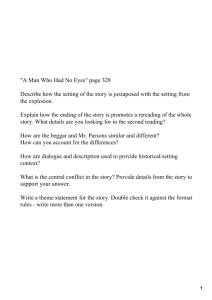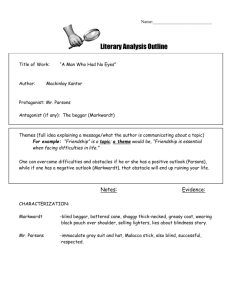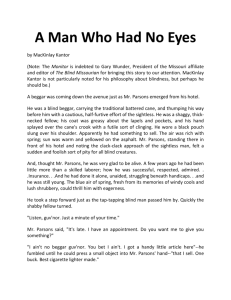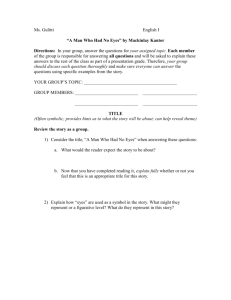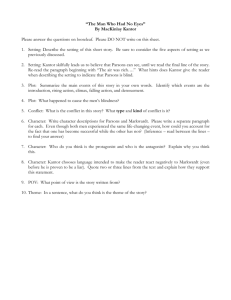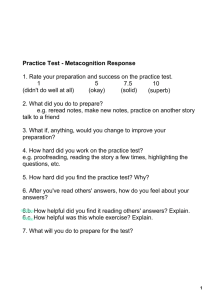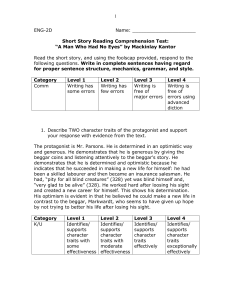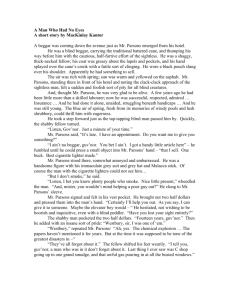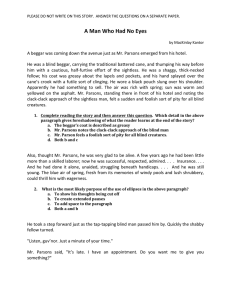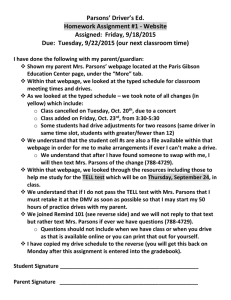Kantor – A Man Who Had No Eyes
advertisement
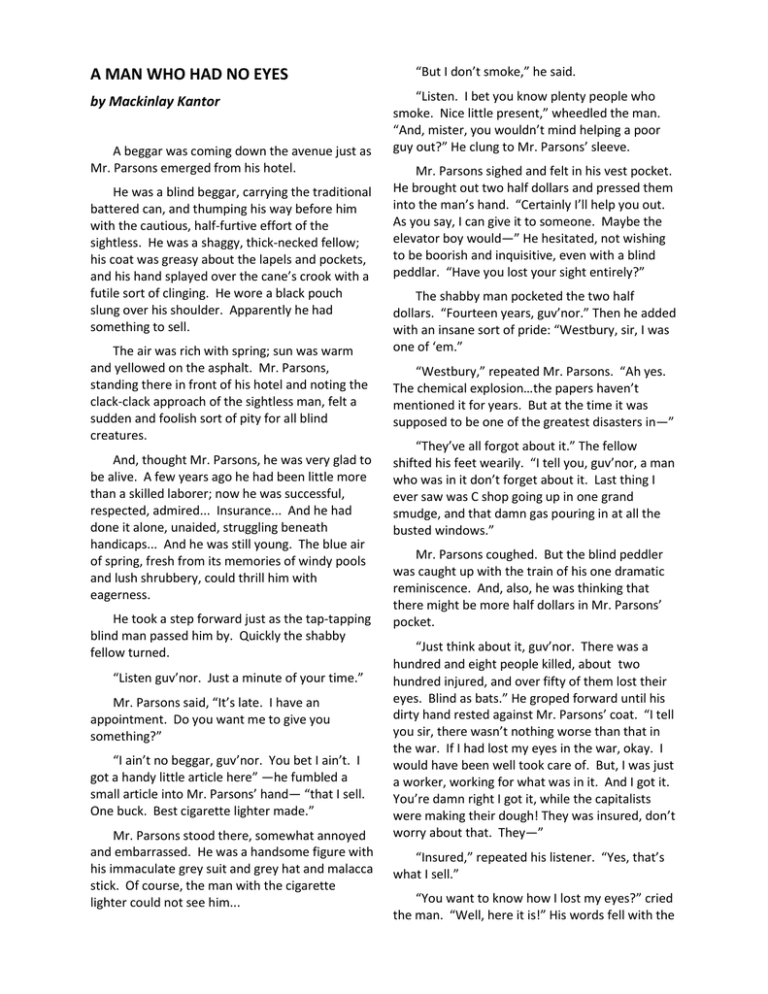
A MAN WHO HAD NO EYES by Mackinlay Kantor A beggar was coming down the avenue just as Mr. Parsons emerged from his hotel. He was a blind beggar, carrying the traditional battered can, and thumping his way before him with the cautious, half-furtive effort of the sightless. He was a shaggy, thick-necked fellow; his coat was greasy about the lapels and pockets, and his hand splayed over the cane’s crook with a futile sort of clinging. He wore a black pouch slung over his shoulder. Apparently he had something to sell. The air was rich with spring; sun was warm and yellowed on the asphalt. Mr. Parsons, standing there in front of his hotel and noting the clack-clack approach of the sightless man, felt a sudden and foolish sort of pity for all blind creatures. And, thought Mr. Parsons, he was very glad to be alive. A few years ago he had been little more than a skilled laborer; now he was successful, respected, admired... Insurance... And he had done it alone, unaided, struggling beneath handicaps... And he was still young. The blue air of spring, fresh from its memories of windy pools and lush shrubbery, could thrill him with eagerness. He took a step forward just as the tap-tapping blind man passed him by. Quickly the shabby fellow turned. “Listen guv’nor. Just a minute of your time.” Mr. Parsons said, “It’s late. I have an appointment. Do you want me to give you something?” “I ain’t no beggar, guv’nor. You bet I ain’t. I got a handy little article here” —he fumbled a small article into Mr. Parsons’ hand— “that I sell. One buck. Best cigarette lighter made.” Mr. Parsons stood there, somewhat annoyed and embarrassed. He was a handsome figure with his immaculate grey suit and grey hat and malacca stick. Of course, the man with the cigarette lighter could not see him... “But I don’t smoke,” he said. “Listen. I bet you know plenty people who smoke. Nice little present,” wheedled the man. “And, mister, you wouldn’t mind helping a poor guy out?” He clung to Mr. Parsons’ sleeve. Mr. Parsons sighed and felt in his vest pocket. He brought out two half dollars and pressed them into the man’s hand. “Certainly I’ll help you out. As you say, I can give it to someone. Maybe the elevator boy would—” He hesitated, not wishing to be boorish and inquisitive, even with a blind peddlar. “Have you lost your sight entirely?” The shabby man pocketed the two half dollars. “Fourteen years, guv’nor.” Then he added with an insane sort of pride: “Westbury, sir, I was one of ‘em.” “Westbury,” repeated Mr. Parsons. “Ah yes. The chemical explosion…the papers haven’t mentioned it for years. But at the time it was supposed to be one of the greatest disasters in—” “They’ve all forgot about it.” The fellow shifted his feet wearily. “I tell you, guv’nor, a man who was in it don’t forget about it. Last thing I ever saw was C shop going up in one grand smudge, and that damn gas pouring in at all the busted windows.” Mr. Parsons coughed. But the blind peddler was caught up with the train of his one dramatic reminiscence. And, also, he was thinking that there might be more half dollars in Mr. Parsons’ pocket. “Just think about it, guv’nor. There was a hundred and eight people killed, about two hundred injured, and over fifty of them lost their eyes. Blind as bats.” He groped forward until his dirty hand rested against Mr. Parsons’ coat. “I tell you sir, there wasn’t nothing worse than that in the war. If I had lost my eyes in the war, okay. I would have been well took care of. But, I was just a worker, working for what was in it. And I got it. You’re damn right I got it, while the capitalists were making their dough! They was insured, don’t worry about that. They—” “Insured,” repeated his listener. “Yes, that’s what I sell.” “You want to know how I lost my eyes?” cried the man. “Well, here it is!” His words fell with the bitter and studied drama of a story often told and told for money. “I was there in C shop, last of all the folks rushin’ out. Out in the air there was a chance, even with buildings exploding right and left. A lot of guys made it safe out the door and got away. And just when I was about there, crawling along between those big vats, a guy behind me grabs my leg. He says, ‘Let me past, you!’ Maybe he was nuts. I dunno. I try to forgive him in my heart, guv’nor. But he was bigger than me. He hauls me back and climbs right over me! Tramples me into the dirt. And he gets out, and I lie there with all that poison gas pouring down on all sides of me, and flame and stuff…” He swallowed—a studied sob—and stood dumbly expectant. He could imagine the next words: Tough luck, my man. Damned tough luck. Now I want to—“That’s the story, guv’nor.” The spring wind shrilled past them, damp and quivering. “Not quite,” said Mr. Parsons. The blind peddlar shivered crazily. “Not quite? What do you mean, you—” “The story is true,” Mr. Parsons said, “except that it was the other way around.” “Other way around?” He croaked unamiably. “Say, guv’nor—” “I was in C shop,” said Mr. Parsons. “It was the other way around. You were the fellow who hauled back on me and climbed over me. You were bigger than I was, Markwardt.” The blind man stood for a long time, swallowing hoarsely. He gulped: “Parsons. By heaven. By heaven! I thought you—” And then he screamed fiendishly: “Yes. Maybe so. Maybe so. But I’m blind! I’m blind, and you’ve been standing there letting me spout to you, and laughing at me every minute of it! I’m blind!” People in the street turned to stare at him. “You got away but I’m blind! Do you hear? I’m—” “Well,” said Mr. Parsons, don’t make such a row about it, Markwardt...So am I.” Irony: A result that is opposite or in contrast to what is expected. Many short stories have an ironic “twist” at the end. Questions for “A Man Who Had No Eyes” 1. Explain the coincidence that plays an important part in the story. 2. Find and QUOTE at least TWO examples in the story that provide hints about Mr. Parsons’ blindness before he tells Mr. Markwardt. 3. Compare the two characters’ attitudes toward blindness. Consider how each has led his life since the accident before writing your answer. 4. What might you say about Mr. Markwardt’s character after you know everything he has done? 5. If you were Parsons, would you forgive Markwardt? Why or why not? Before answering, consider the life he has led since becoming blind. 6. The title “A Man Who Had No Eyes” has an obvious explanation. How else does it describe one of the men in the story?
